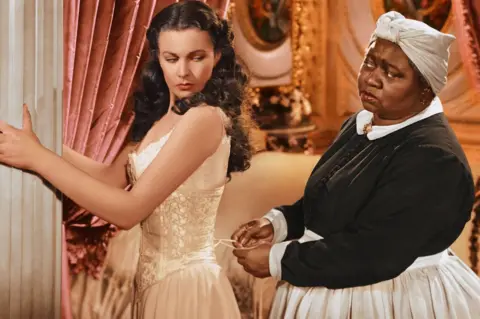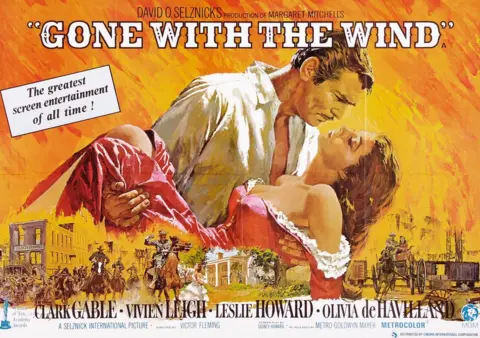Gone with the Wind removed from HBO Max
 Getty Images
Getty ImagesGone with the Wind has been taken off HBO Max following calls for it to be removed from the US streaming service.
HBO Max said the 1939 film was "a product of its time" and depicted "ethnic and racial prejudices" that "were wrong then and are wrong today".
It said the film would return to the platform at an unspecified date with a "discussion of its historical context".
Set during and after the American Civil War, Gone with the Wind has long been attacked for its depiction of slavery.
Based on the novel by Margaret Mitchell, it features slave characters who seem contented with their lot and who remain loyal to their former owners after slavery's abolition.
Gone with the Wind received 10 Oscars and remains the highest-grossing movie of all time when its takings are adjusted for inflation.
Hattie McDaniel became the first black actress to be nominated for, and win, an Academy Award for her role as domestic servant Mammy.
Writing in the Los Angeles Times this week, screenwriter John Ridley said the film "glorifies the antebellum south" and perpetuated "painful stereotypes of people of colour".
"The movie had the very best talents in Hollywood at that time working together to sentimentalise a history that never was," continued the Oscar-winning screenwriter of 12 Years A Slave.
 Getty Images
Getty ImagesIn a statement, HBO Max said it would be "irresponsible" to keep the film on its platform without "an explanation and a denouncement" of its "racist depictions".
It said the film itself would return "as it was originally created", saying "to do otherwise would be the same as claiming these prejudices never existed".
The wording of the statement is similar to advisories that accompany Tom and Jerry cartoons and other vintage animations on various streaming services.
Disney+ also advises its subscribers that some of its older films - among them 1941 animation Dumbo - "may contain outdated cultural depictions".
HBO Max's move comes amid mass protests against racism and police brutality that have prompted several television networks to reassess their offerings.
White House spokeswoman Kayleigh McEnany - who panned HBO's decision - likened the removal to conversations about whether the US should rename US military bases that are named for Confederate generals who fought against the United States during the Civil War.
"Where do you draw the line here? I'm told you can no longer find on HBO, Gone with the Wind because somehow that is now offensive," she said, questioning whether sites named after the US Founding Fathers would someday be renamed.
HBO's decision follows the removal of Little Britain from Netflix, BritBox and BBC iPlayer. The show saw Matt Lucas and David Walliams play characters from different ethnic backgrounds, including Desiree DeVere - a woman played by Walliams in full blackface.

Analysis by Amol Rajan, BBC media editor
The issue at stake here isn't about one film. It's about a much broader issue of whether we judge history by modern standards, even while recognising that what we consider to be modern standards are fluid, contested and will some day themselves be consigned to history.
Whether it's statues of long dead men or films from 1939, there does seem to be something like a global movement emerging which is asking us to re-appraise our heritage.
That is fraught with difficulty. Where does it stop? I'm reading TinTin with my son at the moment and an exhibition of tolerance it certainly is not. It reads like one long parade of racial cliches.
This might be the beginning of a new front in our culture wars, powered by digital media.
Which makes me think another novelist, William Faulkner, had it about right when he said: "The past is never dead. In fact, it's not even past."

Follow us on Facebook, or on Twitter @BBCNewsEnts. If you have a story suggestion email [email protected].
